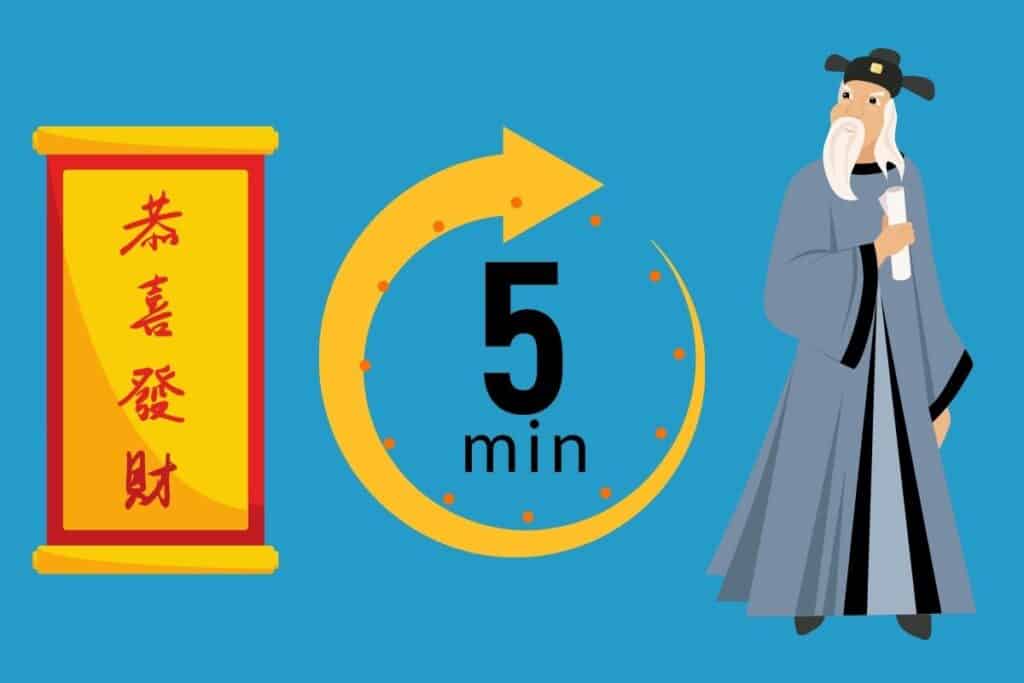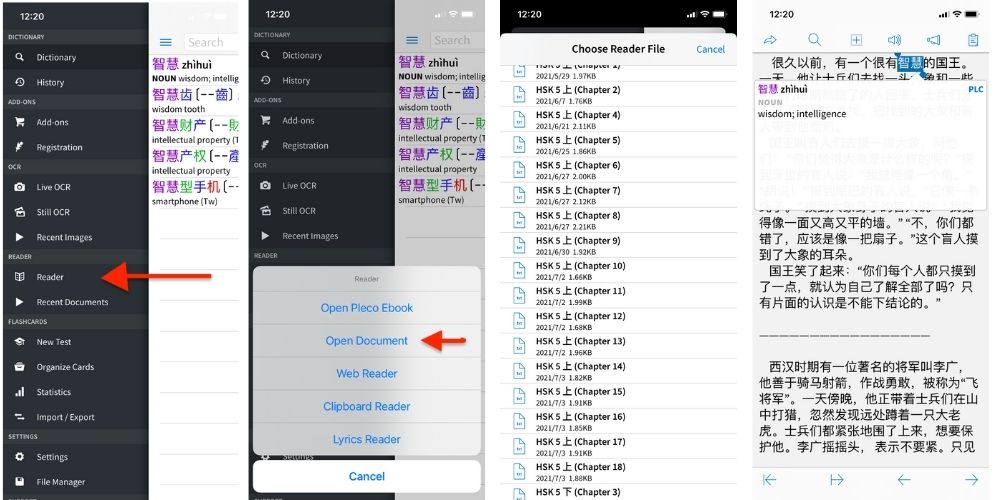
Time is the most valuable of all resources, and we all try to find ways to save it.
If you’re just getting started learning Mandarin Chinese and you’re in a rush, I have some good news and bad news.
The good news?
There’s never been a better time to learn.
The language learning resources available on the market today are stupendous. Some (definitely not all) of them are incredibly effective at speeding up the process of acquiring language.
The bad news?
Your skills in a language directly correlate with how much time you’ve spent with it.
Time + effort = improvement in a language
So, if you’re looking for a short answer to the question, “Can you learn Chinese by studying only 5 minutes a day?” I would say this:
You can learn very little Chinese by studying 5 minutes a day.
If you studied 5 minutes a day for a full year, that’s just over 30 hours of study over the whole year.
That isn’t anywhere near enough to become proficient in any language.
You will notice very little progress and are likely to become de-motivated.
However, if you increase your study time to just 30 minutes per day, things might start happening for you.
“I’ve been learning Chinese for a year and I know nothing! This is impossible.”
Nope.
You’ve put in the same amount of time over a year as you do brushing your teeth. Were you really expecting incredible results?
It’s time for that table from the US Department of State again…

Now this table might not be super accurate, but the salient point is this:
Learning Mandarin Chinese takes time.
Either commit to investing time and find ways to enjoy it, or do something else.
How much time do I need to learn Chinese?
This depends on a bajillion factors, but we’ll try and keep it simple for today.
If you increased your study time to half an hour a day instead of only five minutes, then we might see things happen over the course of a year.
Half an hour a day X 365 days = 182 hours
That’s still nowhere near the 2200 hours the US State Department says you’ll need to become fluent, but that table is inaccurate, and this is a useful hypocrisy.
Even for very busy people, half an hour a day is very doable, especially when you don’t have to do half an hour’s worth of study in one sitting.
The key is to use your time wisely, and I’m going to show you how to do just that.
How to be time-efficient when studying Mandarin Chinese
Although it’s true that we all learn differently, not all methods of learning (specifically acquiring and retaining information) were created equally.
The following are a list of suggestions and tips on how to study specifically with time-saving in mind.
They are based on personal experience in learning Chinese, statements from those in the language learning community, and a bit of good old science thrown into the mix.
Use SRS (spaced repetition software)
Because Chinese is a character-based language, using SRS is an absolute must if you want to learn a lot of characters quickly.
The vast majority of learners will use a free (or very cheap) SRS app such as Anki, Pleco, or Memrise.
Although it isn’t an app (yet) I personally use Hack Chinese.
Spaced repetition is an evidence-based learning technique using flashcards. Newly introduced and more difficult flashcards are shown more frequently, while older and less difficult flashcards are shown less frequently in order to exploit the psychological spacing effect.
At the time of writing, I’ve studied more than 20 000 Chinese words, and if you gave me a test on all of them, I would score 90-95%
More amazing still, I only spend about 30 minutes a day maintaining vocabulary. I don’t say this to boast, I say this because I know for a fact that you can, too, if you use SRS.
Olle Linge, Hacking Chinese
SRS can be used to learn individual characters and words, but it can also be used to…
Sentence mine
Using SRS works for learning individual characters and words, but it’s also great for learning sentence patterns, grammar, and new words in context.
There are two main strategies for sentence mining:
- Creating your own sentences with Anki. For example, creating your own sentences from your personal learning material (a textbook, a tv show, etc.). I take sentences which include a new word or grammar structure from the HSK 6 textbook, as well as from TV shows or movies I like.
- Studying pre-made sentences with Glossika or Speechling. These apps (Glossika is just a site, actually) have thousands of sentences arranged by level. They aren’t customisable. I reckon these tools are better for beginners, and then as you reach an intermediate/advanced level you can create your own sentences.
Import textbook material into the Pleco app
Seriously, I LOVE Pleco, and I’m not even an affiliate.
One specific use for Pleco is using it to import your textbook learning material so you can study on the go.
If you’re on the metro or on the toilet, whipping out your textbook and a pen is a bit of a hassle.
Workbook activities are fine and dandy but the most important thing is repeated exposure to the audio and text within the book.
Time with the language!
Remember, people!
Anyway, do the following:
- Import textbook audio. You don’t need Pleco for this. I use an app called Audio Stretch, but it’s easy and simple to do without an app.
- Create a text file in Pleco. Create a text file of each chapter of your textbooks so you can read it on your phone and highlight unknown words. You can use the OCR text reader to scan the textbook and copy and paste the passage, or you can write it out yourself.

3. Listen and read in tandem. A listening and reading combo is like steroids for language learning.
Utilise shadowing
Shadowing turns your listening practice into something much more powerful.
Also known as ‘parroting’, shadowing is the act of repeating a native speaker in your target language word-for-word, almost simultaneously (or as close as you can get to it).
This can be done while also referring to texts or transcripts of the audio in both the target language and the learner’s native language.
Shadowing has three main benefits:
- It forces you to actively engage with the audio you’re listening to, making your listening practice much more effective.
- It drastically imroves your pronunciation.
- It can be done with any level of Chinese ability.
It will probably feel awkward as hell when you first try, and it will be difficult to practice shadowing at the normal speed.
That’s another reason why I use the Audio Stretch app for a lot of listening activities. You can import audio files, change the speed of playback, and isolate sections of audio to play on loop.
Read, read, and read some more
Most advanced foreign learners of Mandarin Chinese have spent a lot of time reading.
But why is reading specifically so effective?
Reading is repeated visual exposure to the language.
Think about it for a second.
Most people you know who have abroad vocabulary and excellent command of any language are usually those who read a lot.
Finding suitable reading material for your level takes some practice. Many new learners complain about finding the sweet spot in terms of reading material that actually benefits them.
In my opinion, reading is only ineffective if you’re constantly having to put the book down to look up new words. It’s annoying and not a good use of your time.
However, even if you know nearly all of the characters and words in your reading material, it is still incredibly beneficial for your acquisition of language for the following reasons:
- Reinforcements and repetition of characters in context.
- Repeated exposure to grammar patterns.
- You aren’t rushed and under pressure like you are in a conversation.
The legendary polyglot (a real one) Steve Kauffman says that reading makes up the bulk of his study time when learning a new language.
Use your filler time with passive learning
When it comes to language learning, you can put a lot of effort into your studies, and still be unsure if you’ve benefited at all. It’s not like you’ll see very tangible progress day by day, especially as you move into an intermediate level.
This can be made even more difficult if you’re really pushed for time.
However, the brain is a remarkable thing, and even if you think what you’re doing isn’t helping, you’d be surprised at how exposure is helping you over time.
Constant exposure to a language through listening might not be as time-efficient as using SRS apps or shadowing, but it’s still time spent with the language.
Here are a couple of examples of what I mean by passive listening:
- Radio – When I wake up, I usually stick on a Singaporean radio station while I potter around, wash my face, have breakfast, etc. I don’t listen super intentively because I’ve just woken up. But I still try and take it in, see how much I understand, feel the tones go up and down, etc.
- Chinese subtitles on Netflix – Most English shows on Netflix come with Chinese subtitles these days. Turn them on when you watch any show. You might not be looking at them all the time, but they’re there as a reference for you to glance at and take in from time to time.
Think of it as ‘my brain is too tired to actively learn’ kind of learning. It isn’t taking up any time out of your day, and you can passively listen whilst taking care of other tasks.
You might not think it helps, but you won’t realise how helpful it is until you put the hours in.
Further Reading
- 100+ MANDARIN LEARNING RESOURCES: THE FASTEST WAY TO FLUENCY
- LEARNING CHINESE: 15+ LISTENING TOOLS PERFECT FOR BEGINNERS
- THE ULTIMATE GUIDE TO LEARNING CHINESE IN CHINA
- THE 24 BEST MANDARIN STUDY RESOURCES FOR BEGINNERS
- 14 REASONS WHY YOU SHOULD LEARN MANDARIN CHINESE
- IS IT EASY TO LEARN MANDARIN CHINESE?
- THE 21 BEST APPS TO LEARN CHINESE
- STUDYING MANDARIN AT A UNIVERSITY IN CHINA: WHAT YOU NEED TO KNOW
